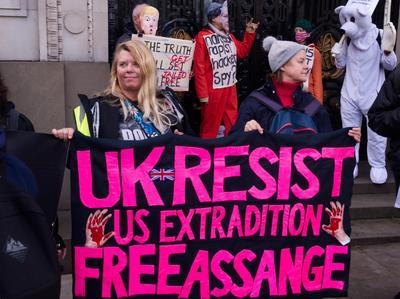Right on his side: growing opposition to Assange's prosecution
NEC member Tim Dawson reports on Julian Assange's case, and action journalists can take to show their support.
When Andrew Neil devoted his column in the Daily Mail to the Assange case, his prejudices rang clear; Assange, Neil told his readers, is: reckless, cavalier, stupid, a narcissist, a sexual predator and careless with personal hygiene.
But once Neil had pleasured himself with a discharge of invective, he got to his real point. “If (Assange) ends up incarcerated in America, journalists all over what is still called the free world will wonder if it’s worth the risk when they are presented with classified information that deserves to see the light of day”.
His conclusion was clear:
“when democracy is under threat from Ukraine to Hong Kong, far better for Britain to refuse to extradite Assange and send a clear message – a clarion call – to the free world and beyond: we do not jail our dissidents.”
Neil is not the only journalist to arrive at this view – albeit late in the day. In an editorial on the same day, The Independent contrasted its own opinion five years ago with today: then, it accused Assange of entanglement with Russian interests and the authoritarian right.
Today it concluded:
“Mr Assange has suffered enough. If his appeal fails, Ms Patel (the UK’s Home Secretary/minister for the interior) should exercise compassion with whatever legal fig leaf the Home Office’s lawyers can find. It is time to let Mr Assange go."
The British media may have been slow coming to Assange’s case, but its shift in opinion is critical. It is testimony to those who have stuck with the case when it was unfashionable, and a reminder of how much more there is to do. Because where the op-ed pages have led, many individual journalists are following only slowly.
On Friday, Patel gave the green light for Assange’s dispatch to face charges. He is sought by the United States under the Espionage Act for actions familiar to any journalist – cultivating a source and encouraging the discreet passing of information proving wrong doing.
He is now very nearly at the end of the legal process that began with extradition hearings in February 2020, and occupied London’s Old Bailey for a month in September that year. Further appeals are possible, and it was obvious from a press conference on 17 June (at which I spoke from the platform) that these will be vigorously pursued.
Assange’s wife, Stella said: “Our resolve is redoubled for every decision that is taken.”
While his lawyer, Jennifer Robinson told the gathering: “It is hard to imagine a case in which there is more abuse of process and injustice. We will use all avenues open to us to expose this.”
The basis for any appeal will be the points that were dismissed by the Judge who heard the original case. These include: that the UK/US Extradition treaty rules out extradition on ‘political’ grounds; that such has been the abuse of process that a fair trial is impossible; and, that this prosecution would breach guarantees of free expression contained in the the European Convention on Human Rights.
All of these arguments could be made in the Appeal Court, in the UK’s Supreme Court, and at the European Court of Human Rights in Strasbourg. However, there is no guarantee that any of these courts will accept the case. In each, a judge must first rule that there are sufficient contentious points of law for to require a hearing. The Supreme Court, for example, has already rejected a previous application to consider the lower court’s decision that extradition would not be oppressive as a result of Assange’s mental health.
As a result, it is possible that the case for extradition could come to a swift conclusion, in which instance Assange would be dispatched within days. Or, there could be a year or more wrangling in court with the subject, almost certainly, remaining in the Belmarsh high-security prison.
At the press conference, Assange’s wife spoke directly to the massed reporters and photographers. “This affects all of you, you know”, she said. The warm nod of approval for which she might have hoped was not obviously forthcoming – and this gives an idea of the work that journalists’ unions have still to do among their own members.
Of course, dispassion and neutrality can be useful for those who report daily events. When a case threatens our ability to undertake the most important journalistic work, however, even-handedness becomes a dangerous conceit.
In time it will become accepted common sense that this prosecution was a dangerous folly. The question is, how long will that take? How many more days must Assange languish in jail? And, most important, how much damage to free expression and the democracy it supports will we tolerate?
As an absolute minimum, journalists can add their names to the international petition of media workers who oppose this prosecution: https://speak-up-for-assange.org/
The broader the chorus making this case, the louder will be our call. I, for one, welcome all who add their voices, even those with whom I could unite about little else.

© Tim Dawson
